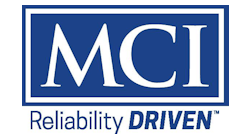A Breakthrough in Rider Accessibility and Commuter Rapid Transit: The New MCI D45 CRT LE
Motor Coach Industries explained that as commuters cover greater distances without the need — or desire — for automobiles, and communities look to build cost effective transportation systems, it is unveiling a new Commuter Coach model to equip the future with comfort, environmental-efficiency and maximum accessibility for an increasingly diverse commuting population. MCI created the new MCI D45 CRT LE to enhance the experience of Commuter Rapid Transit (CRT) and Bus Rapid Transit (BRT) systems for a range of commuters with the goal of improving accessibility.
MCI, whose Commuter Coach model is already North America’s most popular and a prominent staple in fleets serving commuter routes, chose APTA EXPO 2017 taking place in Atlanta to unveil the all new, next generation model, as communities nationwide consider CRT an effective way to respond to commuter tastes and investment objectives in expanding transportation systems.
Deliveries of the Buy-America compliant, Altoona-tested clean-diesel coach are expected to begin in the fourth quarter of 2018. An all-electric version is also in development and will be released in 2020.
“We consider the MCI D45 CRT LE a landmark vehicle on three fronts,” explained MCI President Ian Smart. “First, the model launches a boldly progressive modern design along with the amenities and comfort necessary to getting commuters to switch from commuting by car. It’s important that this is a coach where people want to try commuter travel. Second, we are looking ahead to a more diverse society where different groups of citizens will face a range of mobility issues, and we believe the MCI D45 CRT LE is part of the solution. We listened to what our customers wanted and created a coach like no other with a low entry vestibule that vastly improves dwell times, and the overall passenger experience.”
“Finally, we’re very proud to be rolling out a 100 percent electric version because it becomes the most accessible and environmentally-friendly vehicle we’ve ever created,” Smart said.
While MCI’s current commuter coach model will continue to feature wheelchair lifts, the new D45 CRT LE is designed with a curb-level ramp and second door that opens directly into a same-level patent pending low floor entry (LE) vestibule with passenger seating. Additionally, the forward-door entry opens to an ergonomically-designed spiral entryway that’s well lit and features supportive grab rails. This combined ease-of-entry technology is expected to cut the considerable dwell time of traditional lifts.
The design process for D45 CRT LE involved rigorous analysis and review. MCI engaged a wide range of engineering, design, accessibility experts, including Designworks, a BMW group company, MCI’s long-time consultants on model design, and volunteer members from the National Council on Independent Living (NCIL) and the American Association for People with Disabilities (AAPD). After evaluating 32 alternative concepts, MCI created a functional model and engaged user groups to validate its design.
According to Brent Maitland, MCI’s Vice President of Marketing and Product Planning, “We immersed ourselves in the user experience when designing this coach, seeking the input of a broad range of passengers including users of mobility devices. Their participation guided our low floor entry and vestibule design, and our engineers worked closely with Designworks on the overall styling for it to be an alluring progressive vehicle in the fleets that operate rapid commuter transit. Designed for the highway, it is a versatile, comfortable, transportation solution for regional communities looking to provide the best solution for all their transit users, now and in the future.”
The CRT LE low level entry vestibule accessible by a second door at the midpoint of the coach includes seating for five passengers, allowing for up to two secured mobility devices and an attendant. The model offers a high-capacity 54-passenger seating configuration overall, with seating for 52 when there are two passengers using a mobility device.
“We focused on accessibility, riding and exit experience from the passenger perspective, mapping the journey from waiting to board, entering the coach, securing and exiting,” said Maitland. “It’s some of the most comprehensive user testing we’ve ever done. We are grateful to our participants for their time, feedback, evaluation and design acceptance.”
More about the electric CRT LE
MCI will offer an all all-electric D45 CRT LE with an efficient energy storage and battery thermal management systems driving its motor and control systems, air compressor, HVAC, and all driver controls. Orders will be taken starting next year.
The all-electric model will utilize a high-torque Siemens 2130 LB FT electric drive system for operation at highway speeds with a planned range to meet long-distance commuter applications, currently up to 480 KAs for charging, the vehicle allows for high power plug-in battery EV charging to 100 percent in under three hours.
“Battery technology and performance improves seemingly every day. Each agency has its own range requirement and charging strategy,” said Tom Wagner, MCI Vice President of Public Sector. “As New Flyer, our sibling under the NFI Group, is already an experienced manufacturer in electric vehicle technology, MCI can rapidly become the leader in 100 percent electric coach technology.”
New Flyer manufactures all three current types of zero-emission buses (ZEBs) including battery-electric, trolley-electric, and hydrogen fuel cell electric buses. New Flyer’s unprecedented design and manufacturing capability allows transit authorities the ability to optimize charging method, infrastructure and range for their specific needs.




